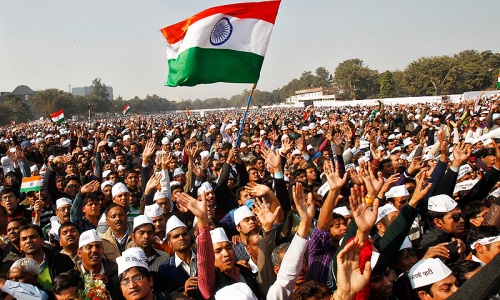NEW DELHI: Indian democracy took a turn toward ancient Athens last week after the Aam Aadmi Party (AAP, or “Common Man’s Party”) went to the people a second time in an attempt to resolve a political dilemma. The fledgling political outfit that earlier this month won 30 per cent of the vote and 40pc of the seats in elections in the city-state of Delhi brought up the notion of “direct democracy” in defence of its decision to hold a referendum in Delhi on the question of whether it should make a bid to form a minority government in the capital.
The referendum itself was a double-pronged affair involving a range of traditional and 21st-century forms. It offered the citizens of Delhi the option of going to a set of public meetings that would return a single “yes” or “no” answer by popular vote, or of sending in their answers by text message or on by phone. Some sceptics questioned the wisdom of such a referendum and the claim of “the will of the people” established by its results.
After all, those who had voted for the AAP might be logically expected to be more willing than others to participate in such an exercise and to favour a yes.
And so it turned out, with the party declaring a 75pc yes vote from individual respondents and a 90pc yes vote from 280 public meetings. After the referendum, the party’s high command decided Dec 23 to form the new government of Delhi.
Its leader, the 45-year-old former bureaucrat and anti-corruption activist Arvind Kejriwal, takes the oath as Delhi’s seventh and youngest-ever chief minister on Saturday at the Ramlila Maidan.
There was much debate, however, of the wisdom of the AAP’s move, which will involve a political version of sleeping with the enemy. The new government of Delhi will have a slender majority in the assembly only because of the support of the Indian National Congress, the very party that was comprehensively voted out of power in Delhi, returning only eight seats after three successive terms in power in the state.
There is no love lost between the two parties, and a single phrase was enough to establish the fragility and mistrust of their compact.
Indeed, for all of the last week, political innocence and experience could be seen jostling one other: The newest major Indian political party set up a government without conceding the moral high ground, while the oldest one offering it a lifeline that might also yield advantages and power to itself just when it had resigned itself to life in the margins.
A fascinating set of calculations and political tradeoffs were behind the AAP’s move to form a government and the Congress’s decision to support it, involving idealism and pragmatism, and the looming shadow of national elections in India, which are due in less than six months.
The installation of a government in Delhi will give the AAP a chance to usher in and test the feasibility of the radical new programme of municipal management and decentralisation of political power envisioned in its manifesto and to appoint an anti-corruption authority with wide-ranging powers, called the Lokayukta.
The ascent to power and prominence in the national capital would allow the AAP to scale up quickly to make its presence felt in the upcoming general, or Lok Sabha, elections — especially, as the political scientist Ashutosh Varshney pointed out this week in a perceptive piece on the “AAP effect” on Indian politics, in the 200 or so urban and semi-urban parliamentary constituencies among the 543 in India.
That, the Congress anticipates, would enable the AAP to short-circuit the rapid rise of Narendra Modi, the leader of the main opposition party, the BJP, whose development record in the western state of Gujarat and rhetoric of “strong governance” have won him a substantial constituency among young urban voters — a large new following distinct from the BJP’s traditional upper-caste, predominantly north Indian vote base.
A few months ago, with the Congress-led coalition government appearing moribund and directionless, it had looked like Modi was going to run away with the game in 2014, but it looks likely now that the “Modi wave” is losing momentum.
But it’s that same Modi wave that likely led the AAP to choose the course of forming a minority government over a new election in Delhi, as such an election would likely be tacked on to the national elections and might be overwhelmed by issues of national significance.
But of course the AAP has its guns trained on not just the BJP but the Congress, and had made a pre-election promise to investigate corruption in the previous Congress government of Delhi. Should things become too uncomfortable for the Congress in Delhi, it is certain to pull the plug on the new government composed exclusively of first-time political office-holders that takes over this weekend. Few expect the new government of Delhi, then, to last its full term.
—By arrangement with the Washington Post-Bloomberg News Service











































